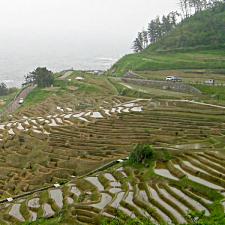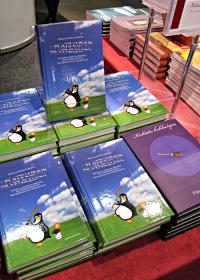Arto's Blog
Pages: << 1 ... 13 14 15 ...16 ...17 18 19 ...20 ...21 22 23 ... 31 >>
Article on crossing Romania by bicycle
Posted: 2007-12-21 11:48:30, Categories: Travel, Romania, Moldova, Cycling, 75 words (permalink)A while ago a friend from the Finnish-Romanian Friendship Association asked if I could write an article about my bicycle tour in Romania for their magazine Viesti-Veşti. The article was published in the most recent issue and it's also available online (in Finnish).
I haven't actually seen the printed version yet, but as far as I know it was published unedited in full lenght. My visit to Moldova is also included in the article.
Manufactured Landscapes
Posted: 2007-12-04 23:47:55, Categories: Ecology, Movies, Politics, 373 words (permalink)
 Recently there was a small movie
festival in Helsinki focusing on climate change and environmental
problems. The films were good, advertising a bit less successful.
Most showings drew only a few dozen spectators
despite the very low price of one euro per ticket.
Recently there was a small movie
festival in Helsinki focusing on climate change and environmental
problems. The films were good, advertising a bit less successful.
Most showings drew only a few dozen spectators
despite the very low price of one euro per ticket.
In my opinion the most impressive film was Manufactured Landscapes. It doesn't preach or make naive observations what is right or wrong. It simply shows examples of human activity changing the nature, and landcapes formed by human activity alone. Some of the views are beautiful, others gruesome. Many times the camera starts from a small detail of a high resolution still photo, zooming out to reveal the enormous scale of the scene. I've never seen mass production presented in a more concrete and memorable way than the first few minutes of this film, with a camera sliding along a corridor in a Chinese factory. Highly recommended.
Other films included two Hollywood takes on climate change: An Inconvenient Truth and The 11th Hour. Of these two, my vote certainly goes to the Inconvenient Truth. It's built around lectures by Al Gore, which sounds like a bad idea at first, but the message comes out in a very clear and convincing way. While not an artistic masterpiece, it might be one of the most important movies of this decade.
The 11th Hour, on the other hand, tries to present so many opinions from various experts that it becomes a heap of scattered pieces of an unsolved puzzle. Of course many of the interviewed people have interesting things to say, which saves the film from being a complete disaster. I especially liked the ideas of Thom Hartmann, Oren Lyons and David Suzuki. However, I couldn't help thinking that a 15 minute film by one of the scientists could have told the story deeper and better than The 11th Hour did in an hour and a half.
Only one of the films in the festival was Finnish. Paratiisi — 3 matkaa tässä maailmassa by Elina Hirvonen was a though-provoking story about immigration. As a nice surprise the director was present for a very interesting Q/A session after the showing.
The photo of this blog entry shows rice fields on the Noto peninsula, Ishikawa prefecture, Japan.
Books of my homeless friends
Posted: 2007-11-24 16:10:27, Categories: Travel, Work, Free software, Literature, 352 words (permalink)
 A few months ago I wrote about meeting
Päivi and Santeri in Phnom Penh, Cambodia. They describe themselves as
homeless loiterers and claim not to be doing much anything, but they've
turned out to be quite active in writing books. They started
with La Habanera (available in Finnish,
in English
and even in Hebrew)
which tells their story of quitting their jobs and leaving Finland to
escape the rat race. More recently published Platinainen
pilvenreuna (in Finnish) describes Santeri's life as an entrepreneur in more detail
through the rise and fall of Finnish Software Engineering SOT Oy, his
open source software company.
A few months ago I wrote about meeting
Päivi and Santeri in Phnom Penh, Cambodia. They describe themselves as
homeless loiterers and claim not to be doing much anything, but they've
turned out to be quite active in writing books. They started
with La Habanera (available in Finnish,
in English
and even in Hebrew)
which tells their story of quitting their jobs and leaving Finland to
escape the rat race. More recently published Platinainen
pilvenreuna (in Finnish) describes Santeri's life as an entrepreneur in more detail
through the rise and fall of Finnish Software Engineering SOT Oy, his
open source software company.
Platinainen pilvenreuna was particularly interesting for me as during the good days of SOT I was the press secretary of the Finnish Linux User Group FLUG ry, collaborating with Santeri quite often. This is also mentioned in the book. Our relationship obviously changed when he left but friendship stayed. I helped a little with the book by reviewing draft versions of it during spring 2007. It was actually quite fun to read about familiar events in the recent history of information technology in Finland, while relaxing at a bamboo hut by the Indian sea.
Many bits and pieces of information in Platinainen pilvenreuna are in public for the first time. Facts are at least mostly correct. The story is told from Santeri's point of view, which may raise some different opinions on how the more private events actually went — the relations between him and some other main players were rocky at times. The main author of the book is actually Santeri's wife Päivi, which was probably good both for the balance and fluency of the text.
If you'd like to check out the book without buying it, it should be available in some libraries in Finland and I have two copies which I'll be happy to borrow (one of them is out right now). At least I personally liked the book and can therefore recommend it. See also Päivi's and Santeri's other books (in English | in Finnish) and Päivi's blog (in Finnish) about literature, reading and writing.
CSC announced last week the collaboration between Helsinki Institute of Physics (HIP) and CSC to build the Finnish part of the data storage and computing environment required to observe what happens to minuscule particles when they hit each other really hard. Digitoday also picked up the story (in Finnish).
I worked for HIP during summers 1999-2002 (the first two being physically located at CERN) and additionally part time along with my studies during 2001-2002. After my exchange year in Japan 2002-2003, I joined CSC. Now, my task there is setting up the data storage system of this experiment — with the help of a couple of colleagues of course. In other words, I'm again working for HIP, although not directly employed by them. Funny how you always end up doing pretty much the same things... :)
Kindle and the future of electronic books
Posted: 2007-11-21 01:34:00, Categories: Free software, Literature, 526 words (permalink)
 A couple of days ago, Amazon unveiled their electronic book
reader called Kindle. Newsweek published an extensive story about
it. In short, Kindle is a roughly A5 size, 300 gram electronic
device with a daylight-readable grayscale display and possibility to
buy electronic books from Amazon.com. See also
Gizmodo's hands on test and Wired's
critical comparison between Kindle and Sony Reader for
more information.
A couple of days ago, Amazon unveiled their electronic book
reader called Kindle. Newsweek published an extensive story about
it. In short, Kindle is a roughly A5 size, 300 gram electronic
device with a daylight-readable grayscale display and possibility to
buy electronic books from Amazon.com. See also
Gizmodo's hands on test and Wired's
critical comparison between Kindle and Sony Reader for
more information.
There has been several attempts in the eBook arena before, none of which have been hugely succesful. It's interesting, considering that most other forms of content such as photos, music and videos have already gone digital. Net is used for many kinds of text content such as email and news, but books and magazines are still mainly read on paper.
The most important new feature in Kindle compared to other similar readers is its mobile Internet connection. Transfer fees are included in the price at least in the U.S. That makes it easy to retrieve a new book any time, without the need of connecting the reader to a computer. Compared to PDAs, the biggest difference is the daylight readable screen and longer battery life. Kindle is advertised to survive for up to one week on a single charge, or two days with the wireless connection enabled. That sounds finally enough for not having to care about charging all the time.
Books to the device are delivered in an Amazon proprietary DRM-protected format. Kindle supports some unprotected formats as well, but most of the content will be delivered as protected files. Fortunately it seems that purchased books can at least be backed up to a computer and continued to be read even if Amazon would decide to discontinue the service. However, copying and reading them freely on any device doesn't seem to be possible. It's not a surprise, but still disappointing.
Having a lightweight, daylight-readable, long battery life, Internet connected device for reading books and other information on the web (Kindle provides access to Wikipedia and some kind of limited web browsing) sounds attractive. I'm certainly a potential customer. However, I hate being locked in some proprietary format for the content I buy. Therefore I'm rather unwilling to go shopping for DRM-crippled books; unprotected PDFs would be much better. Similarly, I've already bought plenty of music online in MP3, Ogg Vorbis and FLAC formats, but not a single copy-protected song. Perhaps I could consider if the restrictions are circumvented first — I have bought DVD's after DeCSS came out.
It's early to say whether Kindle will succeed or not. However, with the backing of a company as large as Amazon, which is able to provide a huge selection of available content, it will certainly not be ignored on the market. The majority seem to be less strict about DRM than me, as iTunes taking over a large chunk of music sales has shown. Whether it'll be the now-released Kindle or one of its successors which will become the killer device, I do believe that the real transition from paper to electronic books has now begun.
(The picture in this article is from Wikipedia, taken by user ShakataGaNai, see the picture page for details.)
<< 1 ... 13 14 15 ...16 ...17 18 19 ...20 ...21 22 23 ... 31 >>

Copyright Arto Teräs <ajt@iki.fi>, licensed under the Creative Commons Attribution-Share Alike 3.0 Unported License. (Unless otherwise mentioned in individual photos or other content.)